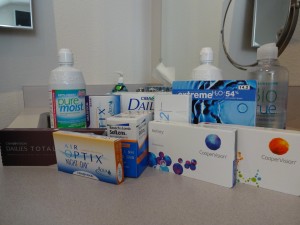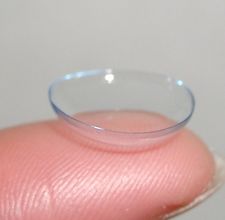The tiny disc of plastic on your eye is one of the most amazing and complex scientific advances in vision correction. Whether you’re nearsighted or farsighted, if you have astigmatism or presbyopia, contact lenses can bring everything into focus for you.
Drs. Griffith and Staton will select the best lens material and design for your prescription and the best care products for your lenses.
LENS CARE DO’S & DON’TS
 DO… wash your hands thoroughly with soap and water and dry them with a lint free towel before handling your lenses.
DO… wash your hands thoroughly with soap and water and dry them with a lint free towel before handling your lenses.
DON’T… use hand soaps that contain lotions or oils. Those ingredients can transfer to your lenses and leave a filmy residue.
DO… replace your lenses as prescribed. Lenses that are past their prime won’t give you the best vision and can compromise the health of your eyes.
DON’T… add new solution to used solution in your lens case.
What’s in those Bottles?
If you scan the eye care aisle at your local retail pharmacy or big box store, you’ll see a row filled with contact lens products. This can be confusing, so here’s a quick look at the main categories and what these products do:
MULTI-PURPOSE SOLUTIONS…These solutions contain everything you need for daily lens care – cleaning, rinsing, disinfection and storage – but each brand has a unique formulation. They’re not all the same. Some multi-purpose solutions include extra ingredients, such as wetting and condition agents, which are designed specifically to help keep lenses comfortable, so you can wear them all day.
HYDROGEN PEROXIDE SYSTEMS… Not only is hydrogen peroxide a great disinfectant, but contact lens care systems that use it have no added preservatives, which is ideal for people who have sensitive eyes and allergies.
SALINE SOLUTIONS… The most important fact you need to know about saline solution is that it will not clean or disinfect your contact lenses. Saline solution is basically sterilized salt water, and it’s mainly used for rinsing contact lenses. Never store your lenses in saline.
GENERICS… Even though store-brand contact lens solutions look almost the same as the name-brand product, some ingredients may differ just enough to cause a sensitivity reaction. And the ingredients in a store-brand product can differ from retailer to retailer – even though the packaging is similar – depending on which manufacturer is supplying the product.
Today’s contact lenses are designed to give you comfortable, sharp vision all day. You should forget you’re even wearing them. If your eyes look red or feel dry or irritated, or if your lenses are so uncomfortable that you need to remove them before the end of the day, it’s time to call us. Your lenses may not be the problem. The culprit could be your solution. Changing solutions is a remedy, but switching to a daily use lens will eliminate contact lens solution altogether.

That’s good to know that you should wash your hands before you use your lenses. A friend of mine came to work one day with some red eyes and he told me that his contacts were irritating him. I’ll have to let him know that this might be because he wasn’t washing his hands before he put his lenses in. Thanks for the awesome advice!
“I often travel and use daily lenses to get around hygiene problems. Then I don’t need any solutions , cases etc. I have found this handy holder for 5 pairs of daily lenses, which I can easily carry with me on the plane, in case I need to remove my lenses.
Macular degeneration is typically age-related, onset about 60 years or more. Thanks for your comment
Daily use lenses are an excellent choice for travel. One of the benefits is you don’t need any accessories, the blister packs are sealed and sterile so a carrying case is redundant. I find slipping the new sealed lenses in your toiletry bag convenient.